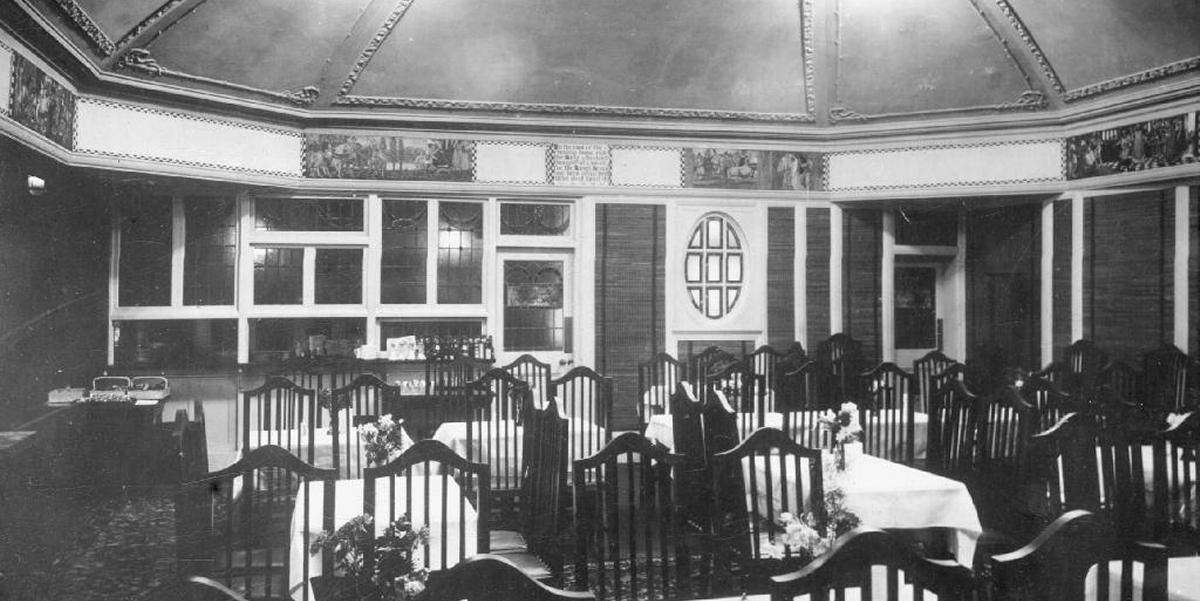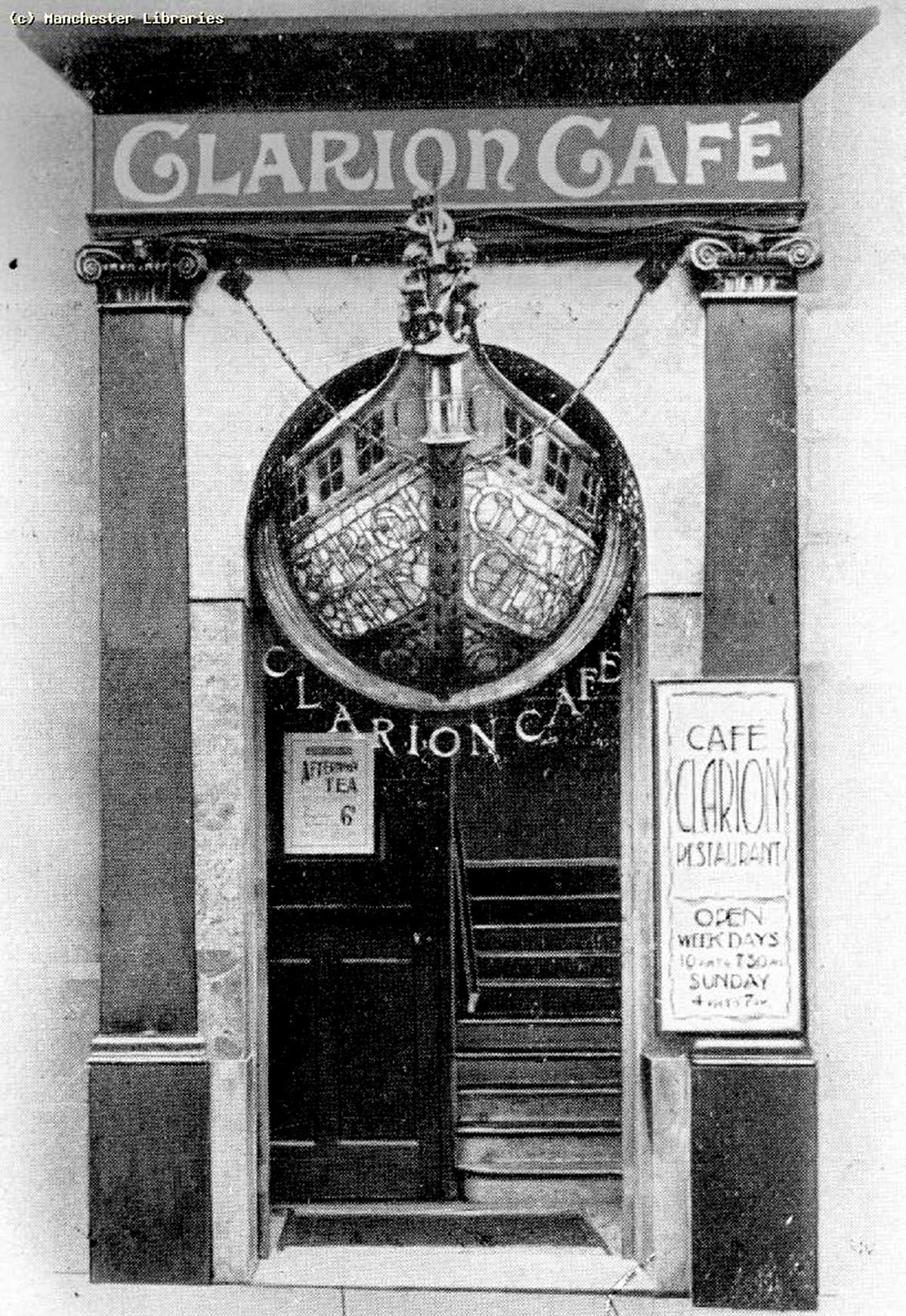The Clarion Cafe

It is between the wars and you are dining in a William Morris style dining room with oak panelled walls, stained glass panels, murals and stylish furniture? Perhaps you are a wealthy businessman who can afford to dine in style on company expenses? Perhaps it is a special occasion. No, you are an ordinary working man and dine there frequently. Welcome to the Clarion cafe.
The Clarion movement was born in 1891 with the publication of the Clarion newspaper by Robert Blatchford. The paper promoted socialism and led to the formation of a variety of practical social orgaisations including the Cycling Club which is perhapsthe best-known, but also rambling clubs and choirs, which came together as the Clarion Vocal Union, which held its first united concert at Manchester's Free Trade Hall in May 1899.
One of the movement's developments was the Clarion Cafe. Manchester's Clarion Cafe, which could seat 150 diners, was established on an upper floor of 50c Market Street and was opened on 31 October 1908 by Robert Blatchford himself. Despite being a socialist enterprise, the cafe was far from what might be thought of as a working man's canteen. The decoration owed much to the design ideas of William Morris and an illustrated frieze around the upper part of the walls was created by the Birmingham artist Bernard Sleigh to illustrate Morris's story "The King's Lesson".
On the floor above the restaurant was the Clarion Club's club room. Here, Clarion members, who paid a subscription between 5s and 10s ((25p to 50p) per annum could enjoy a comfortable lounge with similarly impressive decor, including murals by the well-known artist Walter Crane. While access to the club room was limited to Clarion members, guests could be admitted and MLFHS is fortunate that one of our members came into possession of the original visitors' book covering 1908 to 1920. This shows a regular procession of visitors, including some interesting names including, on 26 March 1911 Keir Hardie, the (then) former Labour Party leader and other prominent members of the labour movement such as Cecil Chesterton, Edward Carpenter and John Robert Clynes, all of whom visited in 1909.

Some visitors came from far afield, in the case of one W. Thomas, from Auckland, New Zealand. Others gave addresses in Switzerland, Sweden and the USA. An interesting visitor was Peter Petroff of the Russian S.D.L.P who visited in 1911 and five years later found himself interned under the WW1 Defence of the Realm Act. The full list of names and scanned pages of the visitors' book are available to MLFHS members.
Despite the elegant surroundings, the catering was relatively inexpensive. It appears to have been run on a non-profit basis, although it did have shareholders and, presumably, some level of dividend was expected. A report in the Clarion newspaper of 4 November 1910 promoted tickets for the Clarion Club's annual dinner, which it said would have a "good menu", at 2s 6d (12.5p) per head. A quarter century later in 1936, a photograph taken shortly before the cafe closed still shows posters advertising afternoon tea for 6d (2.5p). A similarly dated advertisement offers a four-course luncheon for 1s 3d (6.5p). Many Clarion members and early socialists were vegetarian of "fruitarian" (perhaps "vegan") and the restaurant proudly announced "Vegetarian dishes a speciality" in its newspaper advertisements.

The cafe was not simply a place for dining, but also was frequently used as a venue for meetings of a variety of broadly socialist organisations. The Executive Council of tba National of Papermill Workers of Great Britain and Ireliand met there on 26 January 1912 and the Tenants' Defence Association on 27 January 1916 to discuss the issue of rising rents. Manchester Central Branch of the Independent Labour Party met thereregularly.
Events at the cafe were not restricted to politics. The Manchester Evening News of 10 October 1910 announced "Play in the Manchester v City match will commence at 6-30 p.m., at the Clarion Cafe, Market-street. Visitors are cordially invited." This was not, however, a football derby but an opening fixture in the Lancashire Draughts League's programme. On Christmas eve the same year, the cafe hosted a meeting of some 70 members of the Dickens Fellowship and served them a potato pie supper. The Manchester Shakespeare Society also met there in April 1914.
The Clarion Cafe closed around 1936. The original building with its impressive decoration has subsequently been replaced and the new building houses the H&M clothing store. The name, however, lives on, appropriately, in the Clarion Cafe at the People's History Museum in Manchester.
If you want to learn more about the Clarion Cafe, an excellent article by Denis Pye appeared in North West Labour History magazine Issue 21 (1996/97)
- Hits: 1350